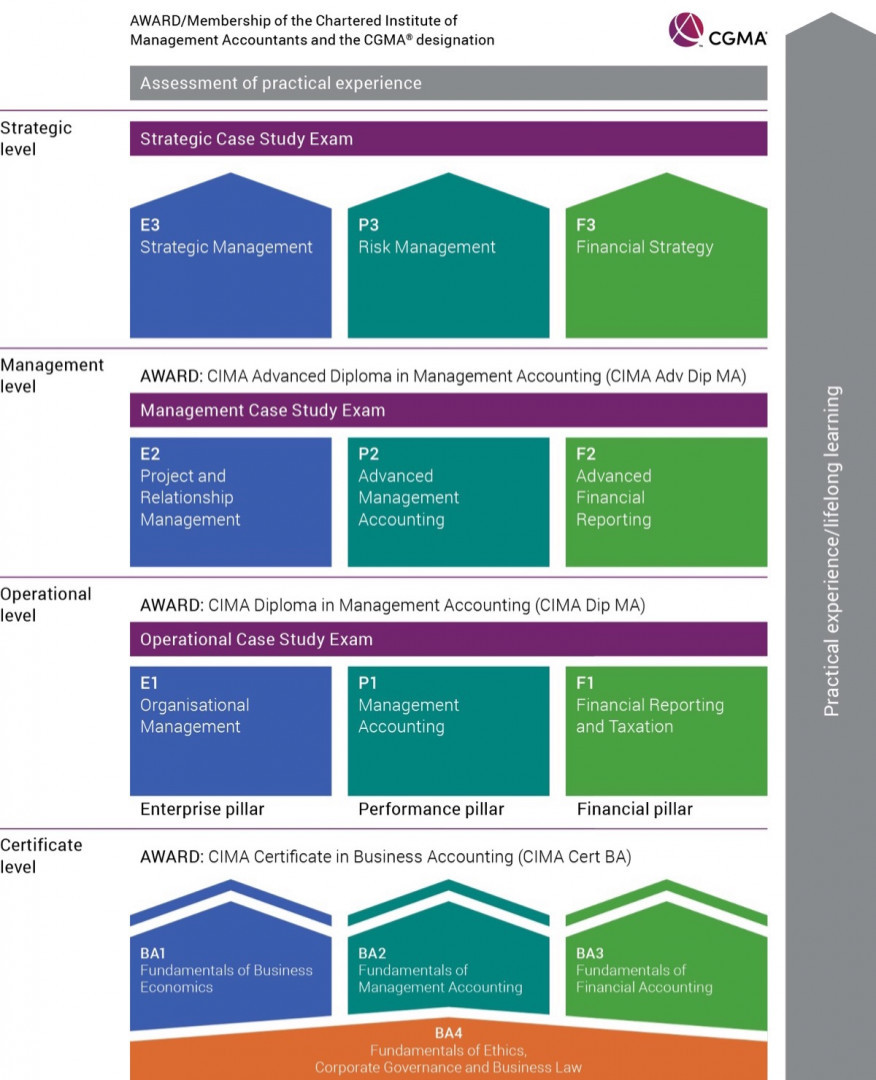Forgot Your Password?
Just enter your account email here
to have the password sent to your email.
By passing this level, you will gain the CIMA Diploma in Management Accounting. Operational level is the first level of the CIMA Professional Qualification and consists of three subject areas and a final case study assessment.
The Operational level focuses on short term decision making. You’ll be able to work with others in your organisation and use appropriate data and technology to translate medium term decisions into short term actionable plans.
After successfully completing the level, you are awarded with the part-qualified designatory letters ‘CIMA Dip MA’ and are ready to embark upon your Management Level journey.
E1 MANAGING FINANCE IN A DIGITAL WORLD
You may qualify for exemptions which let you start your studies at a level that is consistent with the knowledge and skills gained from prior learning. They provide you with the quickest route to CIMA membership.
Click below to establish any exemptions you may be awarded along with further important dates and CIMA information.
Don't Forget! As part of your journey to become an CIMA member, you must demonstrate relevant skills and experience within a real work environment. This is what CIMA'S Practical Experience Requirement (PER) is all about.
To complete CIMA and gain membership you will need to achieve a minimum of 36 months’ experience across the four knowledge areas, with a maximum of 60 months to be evidenced.
Download the per guide
Syllabus structure
The syllabus comprises the following topics and weightings:
A. Regulatory environment of financial reporting: The preparation of financial statements is regulated by laws, standards, generally accepted accounting principles and by codes. The regulations ensure that financial statements of different entities are comparable and that they present a reasonably accurate picture of the performance, position and prospects of the organisation to their users. This section covers who the regulators are, what they do and why and how the regulations are applied. The objective is to provide candidates with a strong foundation for preparing and interpreting financial statements.
B. Financial statements: One of the roles of finance is to narrate how organisations create and preserve value. The financial statements are the means by which narration is done to particular audiences. This section enables candidates to prepare basic financial statements using financial reporting standards. It covers the main elements of the financial statements, what they intend to convey, the key financial reporting standards and how they are applied to prepare financial statements.
C. Principles of taxation: One of the implications of value creation is how that value is distributed to different stakeholders. Taxation is part of this distribution. This section helps candidates distinguish between types of taxes and to calculate corporate taxes. In a digital world where revenue is earned through online trading that spans national boundaries, candidates are introduced to the issues relating to taxation across international borders and the ethics of taxation.
D. Managing cash and working capital: Cash is the life blood of any organisation. The ability to provide cash, at the appropriate cost when it is needed is one of the key contributions that finance makes to organisations. It fulfils finance’s role of enabling organisations to create and preserve value. This section provides candidates with the tools to ensure that the organisation has enough cash to ensure its continuing operations.
EXAM FORMAT
READY TO MAKE A START with rca?
Step right in and start your CIMA & RCA journey. RCA run all courses twice yearly to help keep you moving through the qualification with classes running during the spring and autumn terms for F1, on an evening and weekend basis
INCLUDED IN YOUR F1 LIVE ONLINE/CLASSROOM COURSE
1. Face to face classes or login via the live stream, the choice is yours
2. 30-36 Hours of lectures from subject specialist tutors
3. Exam question practice throughout
4. All classes are recorded and uploaded to your online account to recap and reinforce classroom learning
5. Can't make it to a class? No problem, just catch up via your online recording
6. All learning materials included (tutor course notes, Kaplan study text & exam kit)
7. Tutor support 24/7 via Email, What'sApp or Phone
8. What'sApp group support. with tutor updates with assignments pre & post class
9. Flexible payment terms available
10. Pass Guarantee...
CHECK OUT ALL F1 CLASS DATES AND PRICES HERE

Just enter your account email here
to have the password sent to your email.
This site uses essential cookies for parts of the site to operate and have already been set. Find out more about how we use cookies and how you may delete them HERE. You may delete cookies, but parts of the site will not work.
Input your email address and click the subjects you are interested in for free emails with study guidance, tips and other resources.